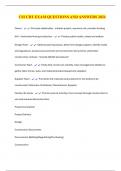Monday 20 May 2024 – Morning
AS Level English Language and Literature (EMC)
H074/02 The language of literary texts
Time allowed: 1 hour 30 minutes
Turn over
, 2
Section A – The language of prose
Charlotte Brontë: Jane Eyre
F Scott Fitzgerald: The Great Gatsby
Chinua Achebe: Things Fall Apart
Arundhati Roy: The God of Small Things
Ian McEwan: Atonement
Jhumpa Lahiri: The Namesake
Answer one question from this section on your chosen prose text.
You should spend about 45 minutes on this section.
1 Charlotte Brontë: Jane Eyre
Write about the ways in which Charlotte Brontë tells the story in this extract.
In your answer you should:
• explore the narrative techniques used in the extract
• consider the extract in the context of the novel as a whole and its genre. [25]
Something of daylight still lingered, and the moon was waxing bright: I could see him plainly.
His figure was enveloped in a riding cloak, fur collared and steel clasped; its details were not
apparent, but I traced the general points of middle height and considerable breadth of chest. He
had a dark face, with stern features and a heavy brow; his eyes and gathered eyebrows looked
ireful and thwarted just now; he was past youth, but had not reached middle-age; perhaps he might
be thirty-five. I felt no fear of him, and but little shyness. Had he been a handsome, heroic-looking
young gentleman, I should not have dared to stand thus questioning him against his will, and offering
my services unasked. I had hardly ever seen a handsome youth; never in my life spoken to one. I
had a theoretical reverence and homage for beauty, elegance, gallantry, fascination; but had I met
those qualities incarnate in masculine shape, I should have known instinctively that they neither had
nor could have sympathy with anything in me, and should have shunned them as one would fire,
lightning, or anything else that is bright but antipathetic.
If even this stranger had smiled and been good-humoured to me when I addressed him; if he had
put off my offer of assistance gaily and with thanks, I should have gone on my way and not felt any
vocation to renew inquiries: but the frown, the roughness of the traveller, set me at my ease: I retained
my station when he waved to me to go, and announced –
‘I cannot think of leaving you, sir, at so late an hour, in this solitary lane, till I see you are fit to
mount your horse.’
He looked at me when I said this; he had hardly turned his eyes in my direction before.
‘I should think you ought to be at home yourself,’ said he, ‘if you have a home in this
neighbourhood: where do you come from?’
‘From just below; and I am not at all afraid of being out late when it is moonlight: I will run over to
Hay for you with pleasure, if you wish it: indeed, I am going there to post a letter.’
‘You live just below – do you mean at that house with the battlements?’ pointing to Thornfield
Hall, on which the moon cast a hoary gleam, bringing it out distinct and pale from the woods that, by
contrast with the western sky, now seemed one mass of shadow.
‘Yes, sir.’
‘Whose house is it?’
‘Mr Rochester’s.’
‘Do you know Mr Rochester?’
© OCR 2024 H074/02 Jun24
, 3
‘No, I have never seen him.’
‘He is not resident, then?’
‘No.’
‘Can you tell me where he is?’
‘I cannot.’
‘You are not a servant at the Hall, of course. You are –’ He stopped, ran his eye over my dress,
which, as usual, was quite simple – a black merino cloak, a black beaver bonnet; neither of them half
fine enough for a lady’s-maid. He seemed puzzled to decide what I was – I helped him.
‘I am the governess.’
‘Ah, the governess!’ he repeated; ‘deuce take me, if I had not forgotten! The governess!’ and
again my raiment underwent scrutiny.
© OCR 2024 H074/02 Jun24 Turn over
, 4
2 F Scott Fitzgerald: The Great Gatsby
Write about the ways in which F Scott Fitzgerald tells the story in this extract.
In your answer you should:
• explore the narrative techniques used in the extract
• consider the extract in the context of the novel as a whole and its genre. [25]
When I came home to West Egg that night I was afraid for a moment that my house was on fire.
Two o’clock and the whole corner of the peninsula was blazing with light, which fell unreal on the
shrubbery and made thin elongating glints upon the roadside wires. Turning a corner, I saw that it was
Gatsby’s house, lit from tower to cellar.
At first I thought it was another party, a wild rout that had resolved itself into ‘hide-and-go-seek’ or
‘sardines-in-the-box’ with all the house thrown open to the game. But there wasn’t a sound. Only wind
in the trees, which blew the wires and made the lights go off and on again as if the house had winked
into the darkness. As my taxi groaned away I saw Gatsby walking toward me across his lawn.
‘Your place looks like the World’s Fair,’ I said.
‘Does it?’ He turned his eyes toward it absently. ‘I have been glancing into some of the rooms.
Let’s go to Coney Island, old sport. In my car.’
‘It’s too late.’
‘Well, suppose we take a plunge in the swimming-pool? I haven’t made use of it all summer.’
‘I’ve got to go to bed.’
‘All right.’
He waited, looking at me with suppressed eagerness.
‘I talked with Miss Baker,’ I said after a moment. ‘I’m going to call up Daisy tomorrow and invite
her over here to tea.’
‘Oh, that’s all right,’ he said carelessly. ‘I don’t want to put you to any trouble.’
‘What day would suit you?’
‘What day would suit you?’ he corrected me quickly. ‘I don’t want to put you to any trouble,
you see.’
‘How about the day after tomorrow?’
He considered for a moment. Then, with reluctance: ‘I want to get the grass cut,’ he said.
We both looked down at the grass – there was a sharp line where my ragged lawn ended and the
darker, well-kept expanse of his began. I suspected that he meant my grass.
‘There’s another little thing,’ he said uncertainly, and hesitated.
‘Would you rather put it off for a few days?’ I asked.
‘Oh, it isn’t about that. At least –’ He fumbled with a series of beginnings. ‘Why, I thought – why,
look here, old sport, you don’t make much money, do you?’
‘Not very much.’
This seemed to reassure him and he continued more confidently.
‘I thought you didn’t, if you’ll pardon my – you see, I carry on a little business on the side, a sort
of side line, you understand. And I thought that if you don’t make very much – You’re selling bonds,
aren’t you, old sport?’
‘Trying to.’
‘Well, this would interest you. It wouldn’t take up much of your time and you might pick up a nice
bit of money. It happens to be a rather confidential sort of thing.’
I realize now that under different circumstances that conversation might have been one of the
crises of my life. But, because the offer was obviously and tactlessly for a service to be rendered, I
had no choice except to cut him off there.
‘I’ve got my hands full,’ I said. ‘I’m much obliged but I couldn’t take on any more work.’
© OCR 2024 H074/02 Jun24





